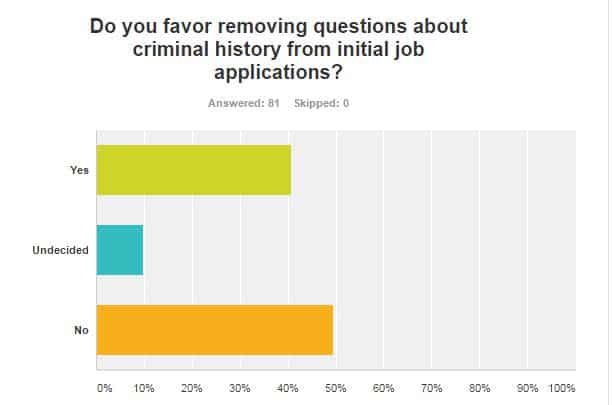Survey: Keep asking job seekers about convictions

Business Record Staff Dec 8, 2015 | 7:45 pm
1 min read time
346 wordsAll Latest News, Education, Government Policy and LawGreater Des Moines business readers are divided on whether questions about job seekers’ criminal records should be removed from initial application forms, according to the results of an unscientific survey in the Business Record Daily in November.
Just under half of 81 respondents to the Nov. 3-5 survey said they do not favor removing questions about criminal history from initial job applications. Nearly 41 percent favored dropping the question and 10 percent were undecided.

We posed the question to readers after President Barack Obama on Nov. 2 directed federal agencies to drop the question from federal job applications, citing a campaign by civil rights advocates and those who seek to help ex-offenders get jobs. Obama said the question can be asked later in the interview process, but the federal government “should not use criminal history to screen out applicants before we even look at their qualifications.”
According to the National Employment Law Project, 19 states, including Iowa neighbors Minnesota, Illinois and Nebraska, have adopted similar policies.
The U.S. Equal Employment Opportunity Commission endorsed removing the conviction question from job applications as a best practice in a 2012 guidance document.
Although Business Record respondents seemed divided on the question, most said they think that ex-offenders are a possible solution to worker shortages in Greater Des Moines. Forty-four percent agreed with that statement while 31 percent disagreed and 25 percent were undecided.
More than 80 percent of respondents were CEOs, business owners, or executive or middle-level managers.
Kevin Pokorny, owner of Pokorny Consulting, favors banning the question “for the simple and practical reason that you may have lost a potential employee who can bring value to your organization.”
Chantelle Mathany, development and communications specialist for the Alzheimer’s Association, reflected divided sentiment on the issue:
“On one hand, I believe in allowing everyone a fair chance to employment because people do indeed change and a prior conviction on paper may exclude a well-qualified candidate. On the other hand, our laws exist for a reason, and if they’re broken, there are consequences, including having a record,” she wrote.








